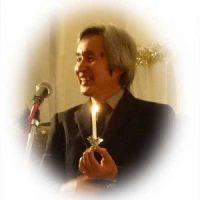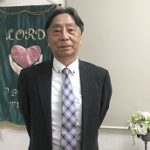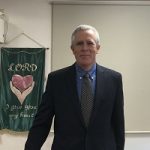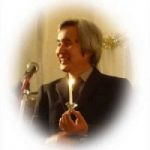↓Audio link to the sermon:
Today’s message is from Mark 14:62, “I am [the Messiah, the Son of the Blessed One].”
Facing the cross, Jesus was about to have a brief trial. It was written that there were many people who gave false testimony against Jesus, but their statements did not agree. The high priest asked him, “Are you the Messiah, the Son of the Blessed One?” Jesus’ answer is the title of today’s message. Through this message, we will make the decision whether to believe in Jesus as Christ or to see Jesus as a liar. We hope that together we will believe in Jesus as the Savior and live a life with the Savior at the center of our hearts. Please read Mark 14:43-72.
Following the prayer at Gethsemane, Jesus was arrested by a crowd sent by the leaders of the time. One of his beloved disciples, Judas, kissed Jesus as a signal, and Jesus got caught. And all the other disciples abandoned him and ran away. Jesus was left alone to this sad reality. He knew that his suffering was the fulfillment of Bible prophecy and said, “Every day I was with you, teaching in the temple courts, and you did not arrest me. But the Scriptures must be fulfilled”(Mark 14:49).
Like the disciples of Jesus, we believers sometimes face the harsh reality of denying our faith. Japanese Christians during World War II also faced a difficult situation. Many were physically persecuted. Even now, since the background of Japanese culture is based on other religions, we sometimes face situations in which we feel it’s easier to deny our faith and beliefs.
In the times like this, we want to remind ourselves that Jesus knows our weaknesses, yet he loves us unconditionally. Even the disciples were forgiven, encouraged, and raised by the resurrected Jesus. Mark records a young man’s experience in verse 51. Some say this young man was Mark himself, the one who wrote this Gospel. However, there’s no record that proves this man as Mark for certain. It is written that “A young man, wearing nothing but a linen garment, was following Jesus.” This man probably wanted to do something for Jesus but he couldn’t, and he fled naked, leaving his garment behind. If this young man was Mark, he and all Jesus’ disciples must have been thrown into unexpected fear. However, people like Mark became great witnesses for Jesus. He grew a lot through fellowship in the church, and that kind of message might be hidden in this passage.
Following the arrest, a brief trial was held late at night and early the next day. In verse 53, “They took Jesus to the high priest, and all the chief priests, the elders and the teachers of the law came together.” In verses 55-56, “The chief priests and the whole Sanhedrin were looking for evidence against Jesus so that they could put him to death, but they did not find any. Many testified falsely against him, but their statements did not agree.” Among these false statements, there is one statement that they focused on, which is also recorded in John 2:19-22.
Do you remember that when Jesus cleansed the temple, he said “Destroy this temple, and I will raise it again in three days”? But the temple he had spoken of was his body. John 2:22 says, “After he was raised from the dead, his disciples recalled what he had said. Then they believed the scripture and the words that Jesus had spoken.” Even the disciples couldn’t fully understand what Jesus meant until they saw the resurrected Jesus.
Some people stood up to give a false statement against Jesus by using these words: “We heard him say, ‘I will destroy this temple made with human hands and in three days will build another, not made with hands’”(Mark 14:58). They said so as if Jesus was actually trying to destroy the temple. Even if their accusation was true, I wonder if it actually deserved a death penalty. In any case, Jesus’ words reveal that Christians are no longer bound to worshipping in the temple in Jerusalem. Worship can take place anywhere. Through the resurrection of Jesus three days after his death, worshipers who believe in Jesus would appear all over the world. The New Testament era would begin. The disciples were able to understand it fully when they saw the resurrected Jesus.
Now, since many of their false statements did not agree, the high priest needed to ask an essential question: in verse 61, “Are you the Messiah, the Son of the Blessed One?”
The expression of “the Son of the Blessed One” refers only to God, and the word “Christ” means the Messiah, the Savior. So the high priest asked Jesus if he was the Messiah. Jesus’ answer was “I am.” And he added, “And you will see the Son of Man sitting at the right hand of the Mighty One and coming on the clouds of heaven.” These were quoted from Psalm 110:1 and Daniel 7:13. Here, Jesus implied the Son of Man will return as a judge with glory.
How did the high priest respond to the words of Jesus? Unfortunately, neither the high priest nor the elders tried to understand that Jesus is the Savior. Instead, their thoughts were caught up only in finding evidence to kill Jesus with. In verses 63 and 64, “The high priest tore his clothes. ‘Why do we need any more witnesses?’ he asked. ‘You have heard the blasphemy. What do you think?'” And, “They all condemned him as worthy of death.”
We, too, need to make the same decision, whether this Jesus is the Savior or a big liar. He can only be one or the other.
Leviticus 24:16 says, “Anyone who blasphemes the name of the Lord is to be put to death.” On that basis, they concluded that Jesus was a blasphemer of God and deserved the death penalty. The trial of Jesus was conducted by those who refused to listen and wanted to put Jesus to death. However, Jesus’ mission was to redeem the sins of mankind. Jesus, while being crucified, said, “Father, forgive them, for they do not know what they are doing” (Luke 23:34).
In my next message, I’m going to talk about the cross of Jesus, but before that let us remind ourselves that we are forgiven by God. “For there is one God and one mediator between God and mankind, the man Christ Jesus, who gave himself as a ransom for all people” (1 Timothy 2:5-6). Let us give thanks that Jesus Christ became our mediator.





